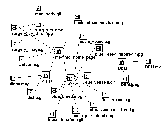
Visualizing the Information Space of Hypermedia Systems
One of the best ways to let the users navigate in hypermedia systems is to
provide them with an overview diagram of the information space. There are many
difficulties in constructing overview diagrams. To be really effective these
need to show not only the structure but more information about the content of
the underlying information space. Moreover, for any real world information
space the diagrams become too large and complicated to be understandable by the
user.
The Navigational View Builder is a tool for allowing the
designer of hypermedia systems to interactively develop efficient views of the
underlying information space. This tool has been used to visualize a section of
the World-Wide Web dealing with research activities at the Graphics,
Visualization & Usability Center at Georgia Tech.
The tool allows the user to use various strategies for forming effective
views.
Use dynamic binding between visual and database attributes so that more
information is presented to the user. Here is a picture of the use of visual
properties to represent underlying information.

Dynamic binding can also be combined with force-based graph layout algorithms
for forming better layouts of the space.
Use content-based and structure-based clustering techniques to form
abstracted views of the space that can fit on the screen. The abstracted views
are shown in three dimensions with the details in two dimensions and the context
in the third. The following is a picture of the visualization of the abstracted
structure in 3D.

Use content-based and structure-based filtering to simplify the information
space. Here is a picture showing the use of filtering to show only the html
pages (of GVU) that are linked to both images and movies.

Besides showing the traditonal graph views, the tool allows the
formation of multiple hierarchies to represent the complex netwrok structure.
The hierarchies can be visualized in various ways. For example, here is
a 3D Tree view of a hierarchical structure that was formed automatically from
the overlall information space by structutal and content analysis.

References:
Mukherjea and Foley, (Short paper)
"Navigational View Builder: A Tool for Building Navigational Views of Information Spaces",
ACM SIGCHI 1994,
April 1994, Boston, MA.
Mukherjea, Foley and Hudson,
"Interactive Clustering for Navigating in Hypermedia Systems",
ACM European Conference on Hypermedia Technology,
September 1994, Edinburgh, Scottland.
Mukherjea and Foley,
"Visualizing the World-Wide Web with the Navigational View Builder",
Computer Networks and ISDN System, Special Issue on the Third
International Conference on the World-Wide Web '95,
April 1995, Darmstadt, Germany.
Mukherjea, Foley and Hudson,
"Visualizing Complex Hypermedia Networks through Multiple Hierarchical Views",
ACM SIGCHI 1995,
May 1995, Denver, Colorado.
Mukherjea and Foley, (Short paper)
"Showing the Context of Nodes in the World-Wide Web",
ACM SIGCHI 1995,
May 1995, Denver, Colorado.
Contact information:
Sougata Mukherjea,
College of Computing,
Georgia Institute of Technology,
Atlanta, GA 30332-0280.
(404) 853-9389
E-mail :
sougata@cc.gatech.edu
